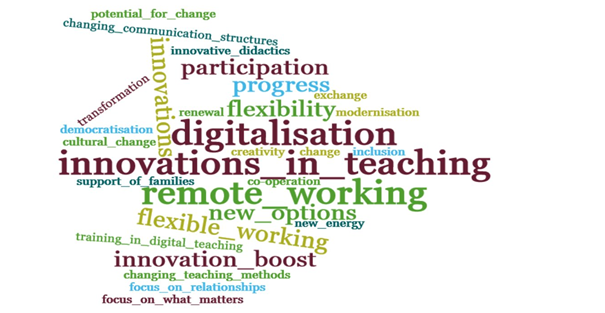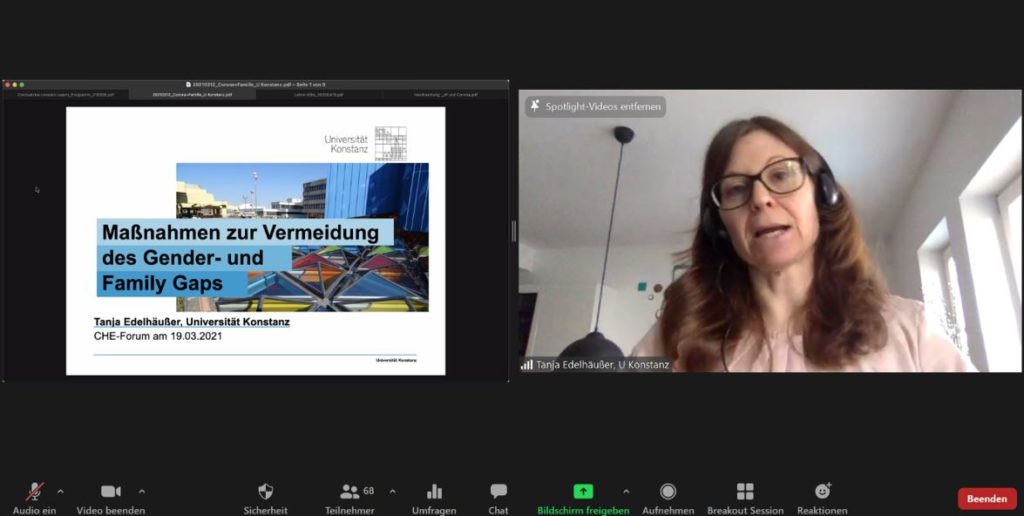
For a year now, the coronavirus crisis has exposed the areas of society that were already in need of reform before the pandemic – as if being viewed through a magnifying glass. This is also true of the higher education system. Despite the current difficult situation, the altered view of studying, teaching and leadership at higher education institutions (HEIs) also offers opportunities. This was illustrated by the online conference on “Bewährungsprobe Pandemie: Welche Lerneffekte nehmen die Hochschulen aus der Corona-Krise für Studium, Lehre und Management mit?“ (The pandemic as a testing ground: What learning effects will higher education institutions gain from the coronavirus crisis regarding studies, teaching and management?), which took place on 18 and 19 March 2021. In three modules, keynote speeches were delivered, providing insights into the challenges faced by German and foreign universities in the year of the Covid pandemic.
The studies and workshop reports presented focused especially on the tried and tested conditions and newly created solutions to meet the challenges, highlighting the lessons learned from the pandemic for the future.
All programme elements also included ample opportunity for interactive exchange, enabling participants to share their personal experiences from the year of the coronavirus.
“The two days have shown that the pandemic has raised many challenges for HEIs. But HEIs can learn from this for the future; creative approaches and formats have been developed. Now it is a matter of benefiting from the lessons learned from the year of the Covid pandemic, and actively putting them into practice,” summarised Professor Frank Ziegele, Executive Director of the CHE Centre for Higher Education.
In his keynote speech entitled “Corona’s Lessons for Global Higher Education”, global tertiary education expert Dr. Jamil Salmi presented the international perspective. Not only teaching, but research and international exchange in particular are affected by the conditions of the pandemic. And yet it is a myth that the coronavirus crisis has been a great equaliser, he stated. Seen globally, students and faculty do not have the same opportunities to work largely from home and resort to online education when incidence rates are high. Covid-19 hits poorer countries and poorer people particularly hard, increasing existing educational disparities. Although Covid-19 exacerbates disparities, the pandemic has also led to an acceleration of innovations in many areas, stated Salmi.
By switching rapidly from face-to-face classes to online teaching over the last two semesters, German HEIs have more or less managed to keep their programmes running, and have been rated highly for their organisation of courses by their students in many cases. These were the findings of surveys conducted by the CHE Centre for Higher Education and a study undertaken by the HIS-Institut für Hochschulentwicklung e.V. Kühne Logistics University and the University of Luxembourg provided insight into their crisis management in workshop reports. Thorben Kurzbach, President of the Federal Association of Pharmacy Students in Germany, outlined the situation for students on practice-based degree programmes. While many students consider themselves to have good digital skills, they rate the digital skills of around one in three of their teaching staff as inadequate. To ensure the sustainable implementation of online teaching, not only technical resources and legal frameworks will be needed in the future, but also permanent support staff at the HEIs.

Speaking on behalf of the “Familie in der Hochschule” association, Tanja Edelhäußer, University of Konstanz, addressed the particular problems faced by university members with family responsibilities or care duties. The pandemic hit female students and scholars particularly hard because they were often the ones who took over the additional care tasks arising due to the closure of external care facilities. For example, a survey showed that 67 per cent of female postdoctoral researchers were considerably adversely affected by family responsibilities during the first lockdown, while the figure for their male counterparts was 44 per cent. Although publication activity was seen to increase overall in the early summer of 2020, there was a 13 per cent drop in activity by female researchers. Women scholars produced fewer publications than their male counterparts. Caroline Friedhoff, Project Manager at CHE, presented the solutions and approaches generated from a survey of university members. What universities need, she said, is good communication, a commitment to achieving a healthy balance between family life and university work, as well as central strategies and initiatives for greater flexibility, and career and staff development, so as not to increase the gender gap and family gap even further during the pandemic. In partnership with the “Familie in der Hochschule” association, CHE calls for issues such as family-friendliness to become firmly and permanently entrenched at top-management level. More information can be found in the CHE study “Der Weg zur familienorientierten Hochschule – Lessons Learnt aus der Corona–Pandemie” (The path towards being a family-friendly university: lessons learnt from the COVID-19 pandemic).
Dr. Deborah Werner, CHE Project Manager for U-Multirank, compared the strategies of German and international HEIs in dealing with the crisis, addressing the question: “What has potential for the future?”. Teaching, learning, assessment and administrative processes have gone digital, both nationally and internationally. Globally, the share of online teaching increased from three per cent pre-pandemic to 73 per cent during the pandemic. Before the outbreak of the pandemic, the majority of examinations took place on campus (93 per cent) – this figure fell to 21 per cent during the pandemic. Welfare state structures mitigated the negative consequences for German HEIs. Universities, both nationally and internationally, should now act with foresight and work on their resilience.
Helmut Köstermenke, Retired Head of Administration and Services, lectured on crisis management at Ruhr West University of Applied Sciences. In this context, he was able to draw on his many years of experience as the Head of Administration and Services of a university of applied sciences. He identified clear communication as a central point in a university’s successful handling of the crisis.
Professor Sabine Kunst, President of Humboldt-Universität zu Berlin, gave an example of the exceptional situation at universities. The crisis situation required a particularly high level of presence, reliable information, quick decision-making and close coordination with university members, in spite of the contact restrictions and, in some cases, uncertain facts. Their crisis management was characterised by the establishment of a professional complaints management system and the recognition and appreciation of all those involved in managing the crisis.
“Which tools of good leadership were helpful?”, CHE asked university leaders in Germany in surveys held in the context of the “University Manager of the Year” award. Most of the university managers emphasised the importance of speed, flexibility, and communicating openly about the measures, both internally and externally, using all conceivable channels. It became clear that information sharing alone was not enough – the emotional level also had to be addressed so as to counter the uncertainties arising from a confusing factual situation, as was the case at the start of the crisis.
